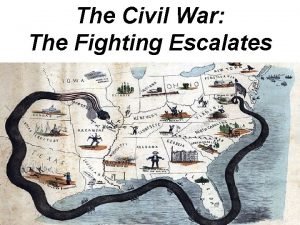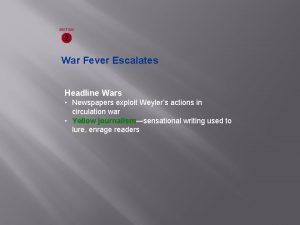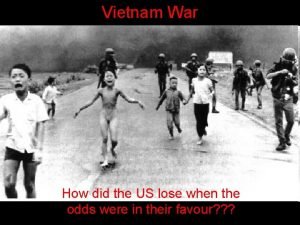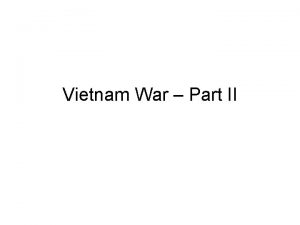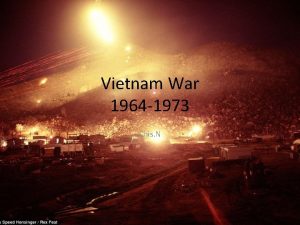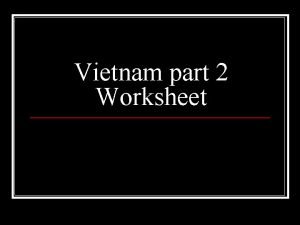The Vietnam War Escalates 1964 Gulf of Tonkin







- Slides: 7

The Vietnam War Escalates

1964 Gulf of Tonkin Incidence August 2, 1964 - Three North Vietnamese patrol boats attack the American destroyer U. S. S. Maddox in the Gulf of Tonkin ten miles off the coast of North Vietnam. A single machine-gun round actually strikes the Maddox with no causalities. U. S. Navy fighters from the carrier Ticonderoga attack the patrol boats, sinking one and damaging the other two. Johnson orders the Maddox to resume operations in the Gulf of Tonkin in the same vicinity where the attack had occurred. Meanwhile, the Joints Chiefs of Staff put U. S. combat troops on alert and also select targets in North Vietnam for a possible bombing raid, should the need arise.

August 3, 1964 - The Maddox, joined by a second destroyer U. S. S. C. Turner Joy begin a series of vigorous zigzags in the Gulf of Tonkin sailing to within eight miles of North Vietnam's coast, while at the same time, South Vietnamese commandos in speed boats harass North Vietnamese defenses along the coastline. By nightfall, thunderstorms roll in, affecting the accuracy of electronic instruments on the destroyers. Crew members reading their instruments believe they have come under torpedo attack from North Vietnamese patrol boats. Both destroyers open fire on numerous apparent targets but there are no actual sightings of any attacking boats. U. S. S. Maddox

August 4, 1964 - Immediate doubts arise concerning the validity of the second attack but, the Joint Chiefs of Staff strongly recommend a retaliatory bombing raid against North Vietnam. Press reports in America greatly embellish the second attack with spectacular eyewitness accounts although no journalists had been on board the destroyers. At the White House, President Johnson decides to retaliate. Thus, the first bombing of North Vietnam by the United States occurs as oil facilities and naval targets are attacked without warning by 64 U. S. Navy fighter bombers. Two Navy jets are shot down during the bombing raids, resulting in the first American prisoner of war, Lt. Everett Alvarez of San Jose, California, who is taken to an internment center in Hanoi, later dubbed the "Hanoi Hilton" by the nearly six hundred American airmen who become POWs.

August 7, 1964 - In response to the two incidents involving the Maddox and Turner Joy, the U. S. Congress, at the behest of President Johnson, overwhelmingly passes the Gulf of Tonkin Resolution put forward by the White House allowing the President "to take all necessary steps, including the use of armed force" to prevent further attacks against U. S. forces. The Resolution, passed unanimously in the House and 98 -2 in the Senate, grants enormous power to President Johnson to wage an undeclared war in Vietnam from the White House. The only Senators voting against the Resolution are Wayne Morse of Oregon, and Ernest Gruening of Alaska who said "all Vietnam is not worth the life of a single American boy. " Ernest Gruening-also introduced Congressional Resolution to establish 911 as national emergency number

The Tonkin Gulf Resolution was repealed by Congress in 1970. Retired Vietnamese general Vo Nguyen Giap, in a 1995 meeting with former Secretary of Defense Robert Mc. Namara, categorically denied that the North Vietnamese had attacked the U. S. destroyers on Aug. 4, 1964. In 2001 it was revealed that President Johnson, in a taped conversation with Mc. Namara several weeks after passage of the resolution, had expressed doubt that the attack ever occurred.

Declaring Less Than War In 1973, an irate Congress passed the War Powers Resolution in response to President Lyndon Johnson and President Richard Nixon's prosecution of the war in Vietnam without a congressional declaration. Under the War Powers Act, the president has 90 days after introducing troops into hostilities to obtain congressional approval of that action.

